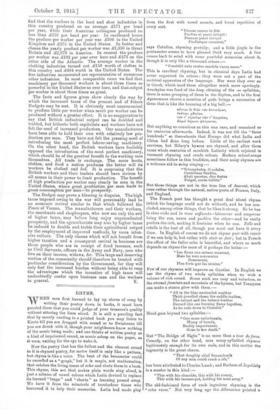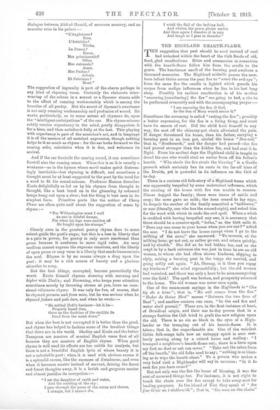RHYME.
WHEN men first learned to lay up stores of song by
• writing their poetry down in books, it must have puzzled them that you could judge of your treasure's quality without uttering the lines aloud. It is still a puzzling fact that by merely reading in a printed book you may listen to Keats till you are drugged with sound or to Swinburne till you are drunk with it, though your neighbours know nothing of the musics being made; and one thinks of written poetry as a kind of imprisoned sound, as musks asleep on the paper, as a were, waiting for the eye to wake it.
Now the poetry that has the fullest and the clearest sound in it is rhymed poetry, for metre itself is only like a pattern, but rhyme is like a voice. The beat of the hexameter could be recorded as a "graph," but it is magic, not mathematics,: that catches the living tones of echo and shuts them in a book. This rhyme,' this art that makes plain words sing aloud, is just a scheme of vowel echoes which Latin devised to replace its learned "longs" and " shorts " as learning passed away. We have it from the minstrels of troubadour times who borrowed it to help their memories. Latin had made play
from the first with vowel sounds, and loved repetition of every sort. "Dianne sumus in fide Puellae et pueri integri Dianam pueri integri Puellaeque canamus,"
says Catullus, rhyming prettily; and a little jingle in the pentameter seems to have pleased Ovid very much. A line comes back to mind with some youthful memories about it, though it is only like.a thousand others :— "Constitit ante mules candids, vacca moos."
This is excellent rhyming, but in classical days Latin bad never organized it echoes : they were not a part of the metrical apparatus of the language. Nor were they ever so in Greek, which used them altogether much more sparingly. Aeschylus was fond of the deep chiming of the -ar syllables; there is some grouping of them in the Septem, and in the first Agamemnon chorus a mention of gods brings a succession of them that is like the booming of a big bell:— wavTow Be thaw 11,v acrruY6i.tont, 15wctrwv, xeovioev, rip v' oiyavfwv r&v T' ityopafwv, pootol Sofyottri WyovTcti.
But anything so conscious as this was rare, and remained so for centuries afterwards. Indeed, it was not till the "three hundreds" or thereabouts that Europe did what India and China had done long before. Little of the earliest work survives, but Hilatys hymns are rhymed, and after them
came whole centuries of monkish Latinity which rejoiced in resonant rhyming and crude echoes. Modern school-songs
sometimes follow in this tradition, and their noisy rhymes are a welcome aid to noisy singing :— “Triumphales, 0 sodales, Cantilenas fundite,
Absit questus, dies foetus Fulget, oorda tollite."
But these things are not in the true line of descent, which runs rather through the natural, native poets of France, Italy. and England.
The French poet has thought a great deal about rhyme (which his language could not do without), and be has con- cluded, among other things, that he likes it strong. So he has /a rime riche and la nine sulismite—labourcur and empereur being the one, neven and parbiea the other—and he vastly prefers the rich, making it feminine when he can. Belle and rebelle is the best of all, though you must not have it every time. In English of course we do not rhyme pair with repair if we can help it, but rather with stair or fair; but in French the effect of the fuller echo is beautiful, and where so much depends on rhyme the more of it perhaps the better "Les dieux eux-mimes moment, Nab lea Tem souverains
Demeurent, Plus forts quo los simian"
Few of our rhymers will improve on Gautier. In English we use the rhyme of two whole syllables when we wish a volume of rich sound. Some such are easy and valueless, as the eternal fountain and mountain of the hymns, but Tennyson can make a stanza glow with them :— 0 All in the blue unclouded weather Thick-jewelled shone the saddle-leather, The helmet and the helmet-feather Burned like one burning flame together, As he rode down to Camelot,"
Hood goes beyond two syllables ;—
" One more unfortunate, Weary of breath, Rashly importunate, Gone to her death."
But "The Bridge of Sighs " is no more than a tour d,e force. Comedy, on the other hand, uses many-syllabled rhymes legitimately enough for its own ends, and in this matter the ingenuity is the great charm.
"That doughty chief Sennacherile Of any man could crack a rib," has been attributed to Charles Lamb; and Barham of Ingoldsbg is a master in this kind:— " This with his chasuble, this with his rosary, This with his incense-pot, holding his 11030 awry."
The eld-fashioned form of suoh ingenious rhyming is the echo verse." Not very long ago the Athenaeum printed a
dialogue between Abd-ul-Hamitl, of savorous memory, and an oracular echo in his palace :— "L'Angleterre Erre.
L'Autriche ?
Triche.
La Prusse P Busse.
ales principaut6s Otees.
Mes cuirasses?
Assez.
Mee Pashas ?
Aehats.
Et Suleiman P Meat."
The suggestion of ingenuity is part of the charm perhaps in any kind of rhyming verse. Certainly the elaborate inter- weaving of the echoes in a sonnet or a Spenser stanza adds to the effect of cunning workmanship which is among the beauties of all poetry. But the secret of Spenser's sweetness is not only cunning workmanship and profusion of sound. He works particularly, as to some extent all rhymers do, upon the "intelligent anticipations" of the ear. His rhyme-scheme subtly creates expectancy in the mind, gently disappoints it for a time, and then satisfies it fully at the last. This playing with expectancy is part of the musician's art, and in language it is of the essence of all metrical expression, though nothing helps to it so much as rhyme : for the ear looks forward to the coming echo, calculates when it is due, and welcomes its arrival.
And if the ear foretells the coming sound, it can sometimes foretell also the coming sense. When this is so it is usually a weakness—as in the hymns where merit makes spirit distress- ingly inevitable—but rhyming is difficult, and sometimes a thought must be at least suggested to the poet by the need for a word to fit his sound-scheme. Professor Masson describes Keats delightfully as led on by his rhymes from thought to thought, like a boat lured on in the gloaming by coloured lamps hung out upon a river; but the thing is best seen in its simplest form. Primitive poets like the author of Chevy Chase are often quite naïf about the suggestion of sense by
rhyme "For Witherington must I wail As one in doleful dumps, For when his legs were smitten off Ho fought upon his stumps."
• Clearly even in the greatest poetry rhyme does to some extent guide the poet's steps ; but this is a loss in liberty that is a gain in power, for poetry is only more emotional than prose bemuse it conforms to snore rigid rules. An easy medium cannot express the supreme emotions, and the liberty of open prose or easy verse is a liberty that sends leanness into the soul. Rhyme is by no means always a drag upon the poet: it may be a rich source of beauty and a glorious stimulus to song.
But the best things, corrupted, become proverbially the worst. Keats himself rhymes dawning with morning and higher with Thalia; and Browning, who keeps your attention sometimes merely by throwing stones at you, loves an occa- sional villainous rhyme. It was only for fun, of course, that he rhymed promise and from mice, but he was serious when he rhymed fatifine and pate lure, and when he wrote :—
" He settled Hoti's business—let it be-- Properly based Outs, Gave us the doctrine of the enclitic De Dead from the waist down."
But when the best is not corrupted it is better than the good, and rhyme has helped to fashion some of the loveliest things that there are in the world. Shelley and Keats and the better Tennyson are masters of musical English verse first of all because they are masters of English rhyme. When good rhyme is well used its effects are too subtle for analysis, but there is not a beautiful English lyrics of whose beauty it is
not a calculable part : when it is used with obvious excess it is a splendid excess, like the .excesses of Swinburne, and even when it becomes masker instead of servant, driving the finest and freest thoughts away, it is a lavish and gorgeous master and almost justifies its usurpation:—
" I am the daughter of earth and water, And the nursling of the sky : I pass through the pores of the ocean and shores, I change. but I cannot I wield the flail of the lashing hail, And whiten the green plains under, And then again I dissolve it in rain And laugh as I pass in thunder."















































 Previous page
Previous page